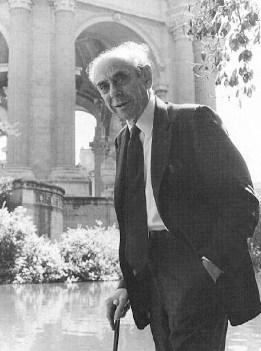| Everyone Is You... Or Me | ||||||
| Frank Oppenheimer, Exploratorium Reprinted from Technology Review Volume 78, Number 7, June 1976 Copyright 1976, Alumni Association of the Massachusetts Institute of Technology, Cambridge, MA 02139 | ||||||
| In my youth I used to wander in the mountains. I would gain a "feel" of the terrain and gradually build up a reliable intuition of how to get from here to there and back again. Always, on these expeditions, I would discover special places - a tiny area, the only one, where fairy slippers grew; a pool in a rushing stream that was deep enough to swim in. Invariably I would find myself excitedly climbing some promising knoll or uppermost peak. Suddenly a whole new vista would open up, showing a great expanse of prairie, a hidden lake in some inaccessible canyon, an entire new ridge of peaks. As a result of these solitary expeditions, I would tell friends what I had found and would want to show it all to them. Somehow it was especially important that they see the view, often at a special time of day - perhaps precisely when the sun was setting. But we would start late or they would be unable to walk as fast as I. I would point to the place where I had found the fairy slippers, but we would walk on by. We would reach the top, and the view would be well worth the effort and the hurry. But gradually I began to realize that there was something wrong with these revisiting expeditions. Although the view far outweighed anything along the way in wondrous and memorable experience, the events along the way had been an integral part of the trip for me, and would also have to be so for the people I wanted to bring pleasure to. If the trip was spoiled through hurry or painful effort, then no one was moved to go searching for views on his own. When I was teaching physical science to high school students, I felt the same kind of thing happening. The course was certainly an improvement on my mountain expeditions. It cleared the trail, mapped out switchbacks |  | |||||
Frank Oppenheimer, director of the Exploratorium | ||||||
| when the grade was too steep, and built bridges or steps when the terrain was impassable. But for those who built the course and came to know it well, it was crucial to reach the panorama of the final chapters, which put together everything that had gone before and opened up grand new vistas. From the vantage point of Bohr's model of the atom, one could look down and see where one had come from and how different and tiny everything looked down there. One could look out at new terrain that begged for future exploration. But in order to reach the vantage point soon enough, the trip had been spoiled. There was no opportunity to explore unexpected and pleasant nooks along the way. | ||||||